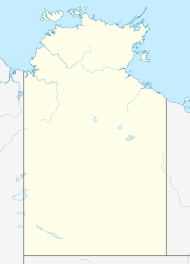Vernon Islands Conservation Reserve facts for kids
Quick facts for kids Vernon Islands Conservation ReserveVernon Islands , Northern Territory |
|
|---|---|
|
IUCN Category V (Protected Landscape/Seascape)
|
|
| Nearest town or city | Darwin |
| Established | 19 April 1974 |
| Area | 81.58 km2 (31.5 sq mi) |
| See also | Protected areas of the Northern Territory |
The Vernon Islands Conservation Reserve is a special protected area in the Northern Territory of Australia. It is located in the Vernon Islands area. This reserve is about 50 kilometers (31 miles) north-east of Darwin, which is the capital city of the Northern Territory.
This conservation reserve includes the Vernon Islands themselves. These islands are a group of three main islands: East Vernon Island, Northwest Vernon Island, and Southwest Vernon Island. It also includes a nearby coral reef called Knight Reef, which you can see when the tide is low. A conservation reserve is a place where nature is protected, often to keep plants, animals, and their homes safe.
How the Reserve Was Created
The Vernon Islands area first became a protected place on April 30, 1974. At that time, the Australian government called it a "crown reserve." This was done under a law called the Crown Lands Ordinance.
Later, in 1979, its name was changed to the Vernon Islands Conservation Reserve. This new name was given under a different law, the Territory Parks and Conservation Act.
Changes in Ownership and Protection
For a while, the special protected status of the reserve was put on hold. This happened because a claim was made for the land in 1978. This claim was made under the Aboriginal Land Rights (Northern Territory) Act 1976. This law helps Aboriginal people get back their traditional lands.
The land claim was finally settled. New laws were passed on December 11, 2015. Then, on March 12, 2018, the land was officially given to the Mantiyupwi Tiwi people. This means they now own the land.
In early 2018, the Vernon Islands Conservation Reserve was not listed on the Northern Territory Government's official list of protected areas. This shows how its status changed after the land was returned to the Mantiyupwi Tiwi people.
What Kind of Protected Area Is It?
In 2016, the Australian government described this reserve in a special way. They said it was an IUCN Category V protected area.
This category, "Category V," means it is a "Protected Landscape/Seascape/Area." These types of protected areas are managed mainly for keeping a special landscape or seascape safe. They also allow people to use the land in ways that fit with its natural beauty and history.
 | John T. Biggers |
 | Thomas Blackshear |
 | Mark Bradford |
 | Beverly Buchanan |


